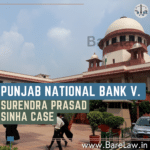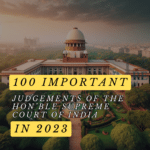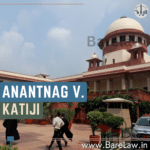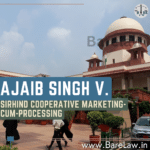Primary Details of the case:

Case Brief on B.K. Pavithra v. Union of India (2017) 4 SCC 620
Introduction
There was one case in particular that provoked a conversation about the imbalance between two competing interests for the community. What do we mean by these two interests here? On one hand, it refers to state’s interest to protect representation of SC/STs whenever needed under Directive Principles of State Policy and few Fundamental rights whereas on the other hand, it means the rights available to all others in the community under article 14, 16 etc. Even previous cases such as Nagaraj, Virpal Singh were argued in this case too which sought to question its validity. The facts and issues of this case are as follows.
Facts
The facts in brief are as follows: The appellants filed a writ petition challenging the validity of Karnataka Determination of seniority of government servants Promoted on basis of reservation act, 2002 i.e. impugned act. As per 2002 act government servants belonging to Scheduled castes and tribes were provided with consequential seniority according to the reservation policy. Reservation policy gave reservation in promotion to the respective S.C.s persons to the extent of 15% and 3% (to S.T.s) but has limited and included only those posts where there was no direct recruitment, which does not exceed 66%. This was made retrospective from April 1978. Assistant Engineers recruited in1987 belonged to SC/ST and they were promoted as Asstt.Executive Engineers while promotion for 1976 was given under general category. Hence an appeal is pending before Supreme Court, India because initially appellants filed a writ petition challenging this reservation act of SCs/Sts but High court held it valid. The issues are as follows.
Issues framed
Three main points referred to and framed by Supreme Court arise out of this case also its issues framed by High Court.
Whether any compelling reasons like social backwardness, inadequacies in representations among SC/STs or administrative efficiencies were shown by Karnataka state in relation to the reservation in promotions?
Whether 15% and 3% for respective Scheduled Castes and Scheduled Tribes as provided under reservation policy are justified or not?
The Supreme Court dealt with ‘whether the impugned act of 2002 is consistent with articles 14 and 16 of the Indian Constitution?’
Laws involved
Article 14 – right to equality
Article 16 – equality of opportunity in matter of public employment and appointment for all citizens.
Article 16(4A) – power of state to provide reservation in promotions to SC/STs in public employment.
Section 3 and section 4 of the Karnataka (Determination of seniority of the government servants Promoted on the basis of reservation) act, 2002
Contentions:
Firstly, counsel for the respondents argued two main points. Firstly, this reservation policy affecting consequential seniority to SC/STs under the act of 2002 has led to inefficiency in administration within the state. They also said that such policy and promotion had violated the right to equality under article 14 and equal opportunity in appointment of public services as known in article 16 of Indian Constitution. Lastly, they objected that there was no evidence or material given by the state on how SC/STs are not adequately represented in the state nor is required constitutionally for administrative efficiency.
On the other hand, learned counsel for respondent contended that reservation percentage provided under Act of 2002 (i.e. 15% &3%) can never said as excessive because they are meant to be seen against rising population of scheduled castes and tribes in the State.
Decision:
Supreme Court of India held as follows after considering facts and contentions:
Firstly, addressing itself to question regarding power of a state, court opined that backwardness, inadequacy in representation and administrative efficiency have been made part and parcel of Article 16(4A) so as not merely mere inadequate representation at promotion stage alone would not suffice even where posts created with an insufficient number would provide for consequential seniority by promoting junior most person thus denying promotions by means of reservations for SCs/STs. Failure to do so will ultimately affect them when it comes to their subsequent ranks or positions. Therefore absence or non-applicability shall necessitate application ‘Catch up’ rule under Article 16(4A).
Finally what is needed is material records showing compelling reasons which entailed state’s exercise its power under Article 16(4A). Hence Supreme Court observed that there was nothing like proof from Karnataka state side for this reason. Thus Supreme Court set aside High Court’s reasoning on validity reservation.
Lastly, court concluded saying section 3 and section 4 of Karnataka act, 2002 would be void as it tends to go beyond the fuzzy scope of articles 14 and 16 and hence refusing to applying catch up rule in promotions. The Court held that the reservation act promoting was set aside, but promotions and benefits which took place prior to that date were not affected by this judgment. In addition, within three months from today all other promotions arising from this decision shall be reviewed and revised appropriately.
Conclusion:
Upon a careful perusal of the above ratio of this case, it is important to note that its judgment conformed very well with that in the context with M Nagaraj. This means that reservations in promotions were made even more stringent by the state before exercising its power under article 16(4A). As a result of State’s failure to establish reasons for necessity as stated in Nagaraj Case, this case favored rights of others over SC/STs.





